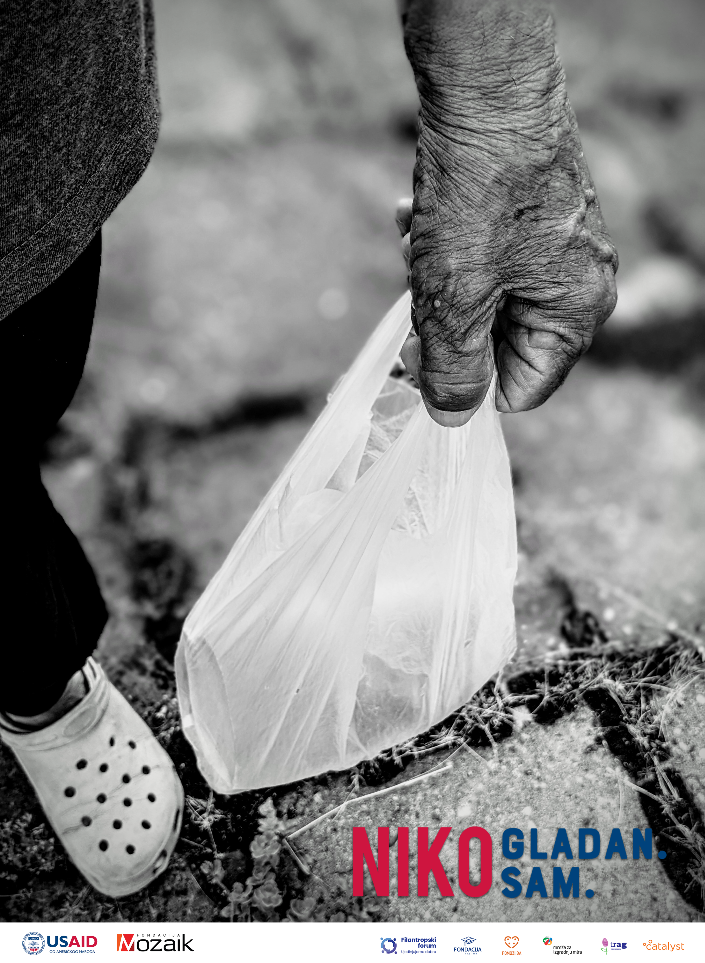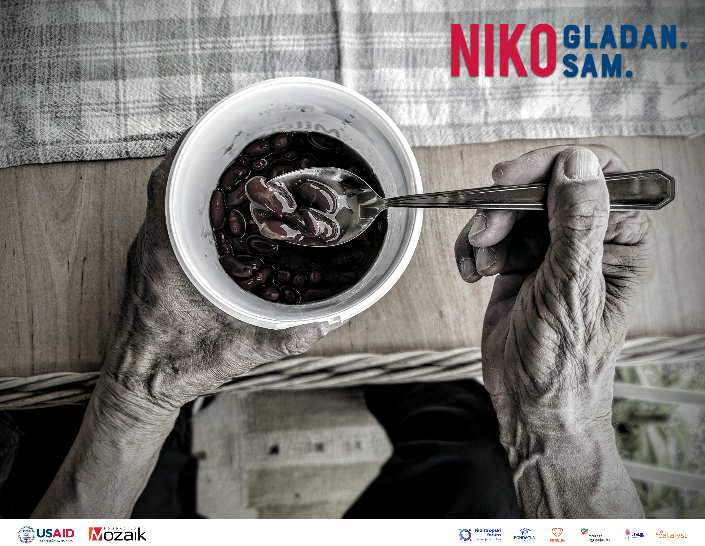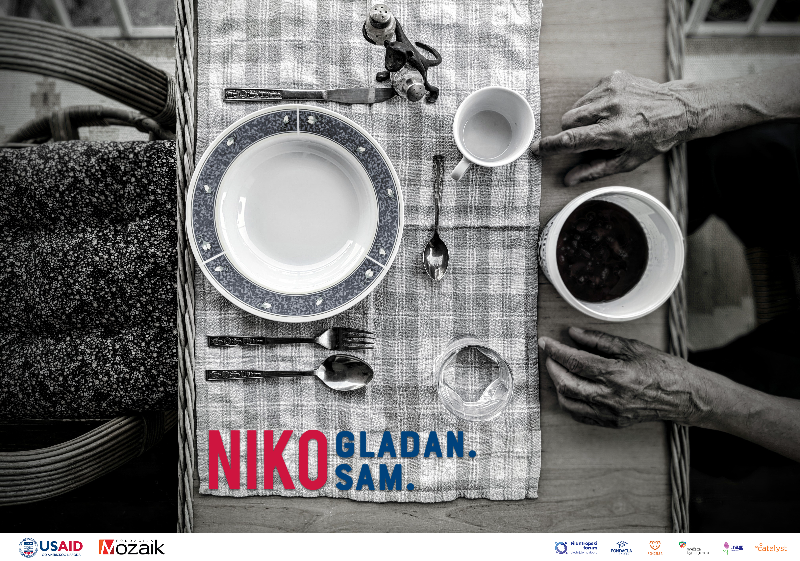Throwing away and destroying food on the one hand, while a large number of people go hungry every day, is a problem in all Western Balkans countries. Its solution is being worked on in different ways, and in Bosnia and Herzegovina it has been in the public's focus for the last few months, thanks to the "Nobody Hungry. Nobody alone. "campaign.
You must have heard about this campaign or noticed it in the media, on social networks, or passing billboards. The data it reveals are incredible - there are more than 60 public kitchens in BiH, one of which is for babies, while more than 400,000 tons of food are thrown away and destroyed every year. This is contributed mainly by the high rate of VAT on food donations, which amounts to 17% and makes it more profitable for companies to throw away and destroy food than to donate it.
The "Nobody Hungry. Nobody alone." campaign advocates the abolition of VAT on food donations before the expiration date. Adnana M. Čamdžić, director of the philanthropy program at Mozaik Foundation, revealed to us what this struggle looks like, what steps have been taken so far, and what can still be done.
"Nobody Hungry. Nobody alone." is part of the Legal Framework for Philanthropy project implemented by Mozaik Foundation together with partners (Hastor Foundation, Peace Building Network, Pomozi.ba Association, Trag Foundation, and Catalyst Balkans), with the financial support of USAID Bosnia and Herzegovina.
Tell us more about the problem of food waste and disposal in Bosnia and Herzegovina.
Adnana: Enormous amounts of food safe for human consumption are thrown away in Bosnia and Herzegovina. According to United Nations data, about 400,000 tons of food is destroyed annually in Bosnia and Herzegovina, a third of which is food that is about to expire or whose packaging is damaged. The estimated value of destroyed food in 2020 alone was 126.6 million KM.
These are devastating data when we take into account the fact that the number of users of soup kitchens is constantly growing in our country. Over 16,800 free meals are distributed every day in our country, and a large number of citizens cannot even get to a soup kitchen by themselves, and depend on home delivery. At the end of last year, the first soup kitchen for babies was opened in Bratunac, and a soup kitchen for children with disabilities operates in Lukavac.
The destruction of food could be greatly reduced if VAT was exempted on donated food that is about to expire. This would greatly benefit vulnerable categories of the population.
What challenges do soup kitchens, of which there are currently more than 60 in Bosnia and Herzegovina, face?
Adnana: The biggest problem of soup kitchens in our country is financing because they always lack funds for the purchase of equipment, inventory maintenance, fuel costs, employee benefits, and so on. Therefore, for the operation of soup kitchens, not only food is needed, but that food also needs to be stored, prepared, served, transported, and the labor force that will do all that needs to be provided. Funds are also necessary for the operation of the food delivery service for users who are unable to come to collect food themselves. If the payment of VAT on donated food that is about to expire would be exempted, the amount of donated food would increase, and the funds that soup kitchens have and are currently spending on food procurement could be directed to the improvement of other segments of the social support system for the vulnerable persons.

How was the "Nobody Hungry. Nobody alone." campaign launched?
Adnana: The initiative is the result of several months of research and a large number of consultations with the public, private and non-governmental sectors, as well as religious communities, which we have been running throughout Bosnia and Herzegovina since 2021 as part of the "Improving the Legal Framework for Philanthropy" program, which is implemented by the Mozaik Foundation together with partner organizations (Hastor Foundation, Pomozi.ba Association, Peace Building Network, Trag Foundation, and Catalyst Balkans) with the financial support of USAID. The “Nobody hungry. Nobody alone.“ campaign was officially launched on Stop Waste Day, April 27, 2022, when we presented data, some of which say that every fifth person in Bosnia and Herzegovina lives below the poverty line and that 280 million meals, which could be donated, are destroyed annually.
What has the campaign been like so far? What results have been achieved so far and how satisfied are you with what has been done?
Adnana: As I said, we started the campaign at the end of April, highlighting messages that draw the attention of our citizens to this pressing problem on billboards. It is certain that we are all somewhat aware of the fact that a large number of people in Bosnia and Herzegovina eat in soup kitchens, as well as those large quantities destroyed, but it is different when you are presented with specific figures.
We spoke with representatives of the Indirect Taxation Authority (ITA) of Bosnia and Herzegovina, where we found understanding and support for our initiative to exempt VAT payment on donated food that is about to expire. We know that this is a long-term process, but it is important that more intense talk about this issue has started, and we believe the Law on VAT would be changed. According to the authorities from the ITA, the draft of the new VAT Law could be in the parliamentary procedure by the end of 2022.
At the beginning of July, we organized a conference where we gathered in one place representatives of soup kitchens from all over Bosnia and Herzegovina, representatives of the authorities and non-governmental organizations working to solve this pressing issue. The reactions have been positive, and we continue to communicate with all of them.
We also sent a letter in which we presented the initiative to the representatives of the authorities at the level of Bosnia and Herzegovina, in which we ask for their support in our goal to amend the VAT Law. We already have the first reactions of some representatives, thanks to whom the initiative to abolish VAT was discussed at the Finance and Budget Committee of the House of Representatives of the Parliamentary Assembly of BiH. Namely, the Commission unanimously supported the initiative on the adoption of the Law on Amendments to the Law on Value Added Tax, which refers to the abolition of VAT on donated food. This is the first step towards enabling more food donations, and we hope that the House of Representatives will also recognize the importance of this initiative and support it.
I remind you that the Mozaik Foundation launched the initiative to abolish VAT on donated food with its partners - the Hastor Foundation, and the Pomozi.ba Association, the Peace Building Network, the Trag Foundation, and Catalyst Balkans, as part of the Legal Framework for Philanthropy program funded by USAID. As part of the initiative, several months of research on the situation on the ground, numerous consultations with companies as food donors, as well as associations and public kitchens, as mediators in donating, ensure that the food reaches those who need it most, were carried out. The result of that initiative is the campaign "No one is hungry." I'm nobody."
We are satisfied with the activities so far because an increasing number of people are interested in this campaign, more and more companies are offering us their support, and we have only positive reactions from representatives of the government. We now expect concrete actions from decision-makers, and we make ourselves available for them to contact us so that we can work together to establish a feasible system of food donations.
Who has supported your campaign so far? How can someone interested support the campaign? How can companies, non-profit organizations, and citizens get involved?
Adnana: The campaign has so far been supported by numerous companies from our country that are still donating food, and for whom it would mean a lot if the payment VAT was exempt on donated food, before the expiration date or whose packaging is damaged. With this legal change, companies would donate much more. We also received support and gratitude from the representatives of soup kitchens, who would appreciate any kind of help, and for whom the exemption of VAT on food donations would ensure greater quantities of food, which they could then distribute to the end users.
We also received support from the Indirect Taxation Authority of Bosnia and Herzegovina, as well as representatives of some ministries from the cantonal and entity levels, as well as from Brčko District.
All those who want to support the campaign in any way can contact us at the Mozaik Foundation, as well as any of our partners on this project. We all have the same goal, which is to improve the legal framework for philanthropy in Bosnia and Herzegovina, so that donations, such as food donations, are facilitated and increased.
What are the most important activities planned for the next period?
Adnana: We are continuing with the activities we carried out in the past period, and considering that we have sent an invitation for support to representatives of the authorities from all governmental levels of Bosnia and Herzegovina, we expect to receive feedback from them. We already have the reaction of some representatives at the state level, who have, as a result of our campaign, sent a question to The Indirect Taxation Authority (ITA) of Bosnia and Herzegovina, asking for their opinion on the proposal to abolish the payment of VAT on donated food that is approaching the expiration date. We expect that there will be more such reactions and questions directed to ITA as well as to us, in the coming period, and we are available to all interested individuals to explain what kind of initiative this is, how much it would mean to the citizens of Bosnia and Herzegovina, as well as to the companies that donate, and in what way and how everyone can take part.
In the past period, we also launched a contest for the anthem of the campaign “Nobody Hungry. Nobody Alone.” in which we asked all creative people to come up with text and music for the campaign "Nobody Hungry. Nobody Alone." We received 14 applications for which the public and the expert committee voted. The winner is the hymn "Nobody Hungry. Nobody alone.” by the band Bratt Section!
Despite the unfavorable environment, what is the current situation when it comes to food donations in Bosnia and Herzegovina? How much is donated, and who are the biggest donors? Are there any trends that can be traced from year to year and what do they look like?
Adnana: Even despite the fact that they have to pay VAT on donated food, a large number of companies donate to soup kitchens and other institutions that need food, but there are also individuals. Many citizens, in cooperation with soup kitchens in Bosnia and Herzegovina, increasingly decide to donate food to those who cannot afford it.
The number of users of soup kitchens has grown significantly in the last two years, and the need for food has also increased. Many companies showed their philanthropic side and, in addition to the amounts they regularly donated, they increased the donations in the past period. It was not the only case. Our philanthropists showed their humanity in some other situations when our citizens needed help, as was the case during the floods.
However, much more food would be donated and a much larger number of users of soup kitchens would have the opportunity to use their services if food donations were exempt from VAT.
Who and why would benefit the most from the exemption of VAT on donations of food (before the expiration date)?
Adnana: If a 0% rate of VAT was introduced for food donations all actors would benefit. Organizations would receive donated food with a real value of at least 126.6 million KM, with a leveled value of 6.33 million KM, the state would receive a minimum of an additional 1.07 million KM in additional VAT and profit tax, and companies would have almost the same costs in addition to being recognized as a socially responsible company.
Soup kitchens and other organizations that feed the hungry would also benefit, that is, through them the end users who would receive donated food worth 126.6 million KM, while the state would not charge any additional amount of VAT in this case. In this way, companies would save the cost of food disposal in the amount of at least 6.33 million KM. However, in this scenario, the state would not have a direct benefit through the amount of VAT collected but would have indirect benefits at all levels of government, more precisely in all budgets through a higher amount of collected profit tax, because companies will have more money available due to smaller costs for food disposal.

Is there goodwill of the public sector to adopt your suggestions for the exemption of VAT on food donations and legal changes? What has been done so far in this regard and what are the next steps? What is the interest of the institutions in charge that you contacted to solve this important issue?
Adnana: We spoke with the representatives of the Indirect Taxation Authority, presented them with our ideas and goals, and received concrete advice from them on which direction to take and how this issue can be resolved. We received full support and were told that it is possible that changes to the Law on VAT will take place by the end of 2022, and our proposals have already been included in the draft of the Law on VAT. We also received support from certain ministries and governments at the cantonal and entity levels, as well as at the Brčko District level. We expect more concrete support in the coming period, when representatives of the authorities to whom we sent an invitation to support the initiative, and on whom the adoption of the Law as well as the establishment of a transparent and efficient donation system, depend.
What are the most important activities that you plan to carry out after the change in the legislation that you are advocating for?
Adnana: After the amendment of the Law, by which companies that donate food before the expiry date to soup kitchens, will be exempted from paying VAT, this possibility will need to be promoted among companies, especially companies from the production and processing sectors and those dealing with food distribution. Through the "Improving the Legal Framework for Philanthropy" program, the Philanthropy Forum in Bosnia and Herzegovina was founded, and the Forum will continue to operate after the end of the program, as a platform that aims “To Unite Good”. The Philanthropy Forum will make it easier for companies to give for the common good through information and education, including such activities on the topic of food donations.
Making it easier to donate food through changes in the law is one of the topics we deal with within the "Improving the Legal Framework for Philanthropy" program, so we will continue to work with our partners, with the support of USAID, to change the laws in Bosnia and Herzegovina so that giving for the common good is eased and enlarged.
What can each of us individually do to contribute to reducing food waste and destruction on the one hand, and increasing food donation on the other?
Adnana: What each of us can do is to take care of our neighbors, i.e. people whom we know do not have the opportunity to provide themselves a meal, to help them by sharing food with them or by helping to get food from soup kitchens if they are physically unable to go for it themselves.
Citizens can also join our efforts to ensure that no one goes hungry by following our activities on the website https://nikogladan.lonac.pro, then following the Philanthropy Forum on social networks and in the lonac.pro community, and sharing the content that we produce with your friends and acquaintances. Everyone can sign a letter of support to exempt donated food from paying VAT. What else they can do is to create content on their profiles about this topic (post, video, photo, story about a heroine or hero from the neighborhood...), they just need to use the tags #NikoGladanNikoSam and @filantropskiforumbih.
The contribution that can be made by a company, association, or organization is to also share the content from our profiles on their pages and profiles. Organizations can also sign a letter of support for exempting food donations from paying VAT.
The contribution that the media and journalists can provide to the campaign is reflected in their coverage of our initiative, by giving this topic time on air. We are also open to meetings with the media to share our research, data, and information we have so that their contributions and texts are of the highest quality. We will be happy to respond to invitations to be guests in the studio, provide statements from the actors on the ground, and participate in a dialogue with credible stakeholders.
Any kind of help and promotion of what we do is welcome, and we are open to everyone and ready to share all the knowledge and information we have.


Leave a comment